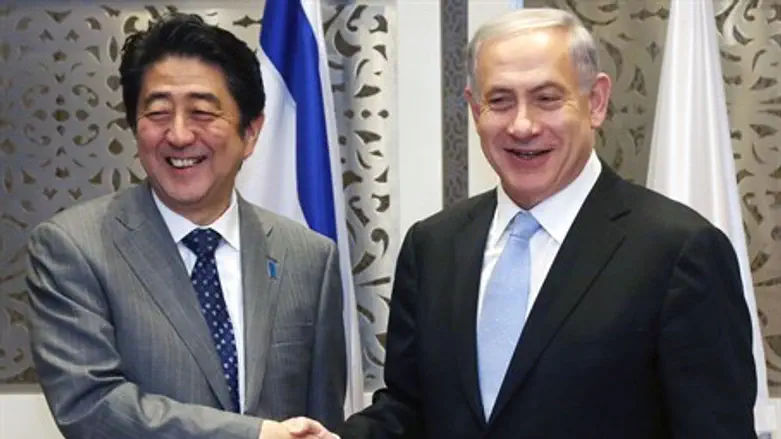
Israel and Japan have become key allies in just under a year, and hints of that mutual influence appear to be on display again as it was announced Thursday that Japanese Prime Minister Shinzo Abe will address Congress on April 29, after Prime Minister Binyamin Netanyahu spoke there March 3.
Republican House Speaker John Boehner, who invited Netanyahu, announced that Abe was invited on Thursday, noting he "will become the first Japanese leader to address a joint meeting of the United States Congress, and we are proud to host this historic event," reports The Japan Times.
“His address will provide an opportunity for the American people to hear from one of our closest allies about ways we can expand our cooperation on economic and security priorities,” Boehner's statement added.
Israel has increasingly been focusing its attentions towards Asia as Europe continues to show diplomatic hostility, and Japan for its part has been seeking a greater global role under Abe, who has dedicated to fighting terrorism in the Middle East.
Prof. Kent Calder, Director of Japan Studies at Johns Hopkins University, told Keizai News in a Japanese-language interview that "just as Israel's Prime Minister Netanyahu went (to Congress) this month, all of the major (American) allied countries' leaders address (Congress)." He pointed out that South Korea's president has spoken there six times.
Explaining the speech, Calder noted that May marks the 70 year anniversary to the end of World War II, and therefore Abe's address may aim to further strengthen the alliance with America ahead of anticipated renewed criticism from China and South Korea for its actions in the war.
Japan enjoys a security treaty with America, whereby the US is obligated to defend the island nation in case it is attacked. However, amid concerns that American influence worldwide is flagging under US President Barack Obama, Abe has been actively pushing for a more active role on the world stage.
Tides of change, Japan's largest warship
Abe has been pushing to change Article Nine of the Japanese constitution that was authored by the US after World War II, and by which Japan forewent the right to war other than defensive actions on its homeland. The push for change has raised controversy in Japan, which has experienced decades of pacifism.
Japan has one of the largest armies in the world, with a reportedly fixed 1% of its national annual budget for defense spending being enough to give it immense firepower given its GDP being the third largest in the world.
On Thursday, the same day as Abe's invitation to Congress, Japan's Maritime Self-Defense (MSDF) took possession of the Izumo, Japan's largest warship since World War II, reports CNN.
The massive military piece features a length of 241 meters (791 feet), a crew of 470 and a standard displacement of 19,500 tons. According to the Japanese-language NHK, it cost a whopping 120 billion yen, which is over $1 billion.
The ship reaches the proportions of the two legendary Yamato-class battleships used by Japan in World War II, which were the largest warships to ever sail the seas.
In an instance of fortuitous timing given the recent acquisition, the wreck of one of the Yamato ships, the Musashi, was discovered earlier this month by Microsoft co-founder Paul Allen. The Musashi sported the largest cannons ever seen in naval warfare.
Commenting on the latest addition to Japan's naval force, Defense Minister Gen Nakatani said the ship would host joint operations and serve as a command center. He denied speculations that it could be used as an aircraft carrier, a class of ship forbidden by Japan's constitution, stressing that it was meant for peacekeeping and rescue operations.
The Izumo can hold seven anti-submarine patrol helicopters and two rescue and transport helicopters, which Nakatani noted could help detect advanced Chinese submarines. Japan has long been in a territorial dispute with China over the Senkaku Islands in the South China Sea, a tense standoff that has often threatened to spill over into actual skirmishes.